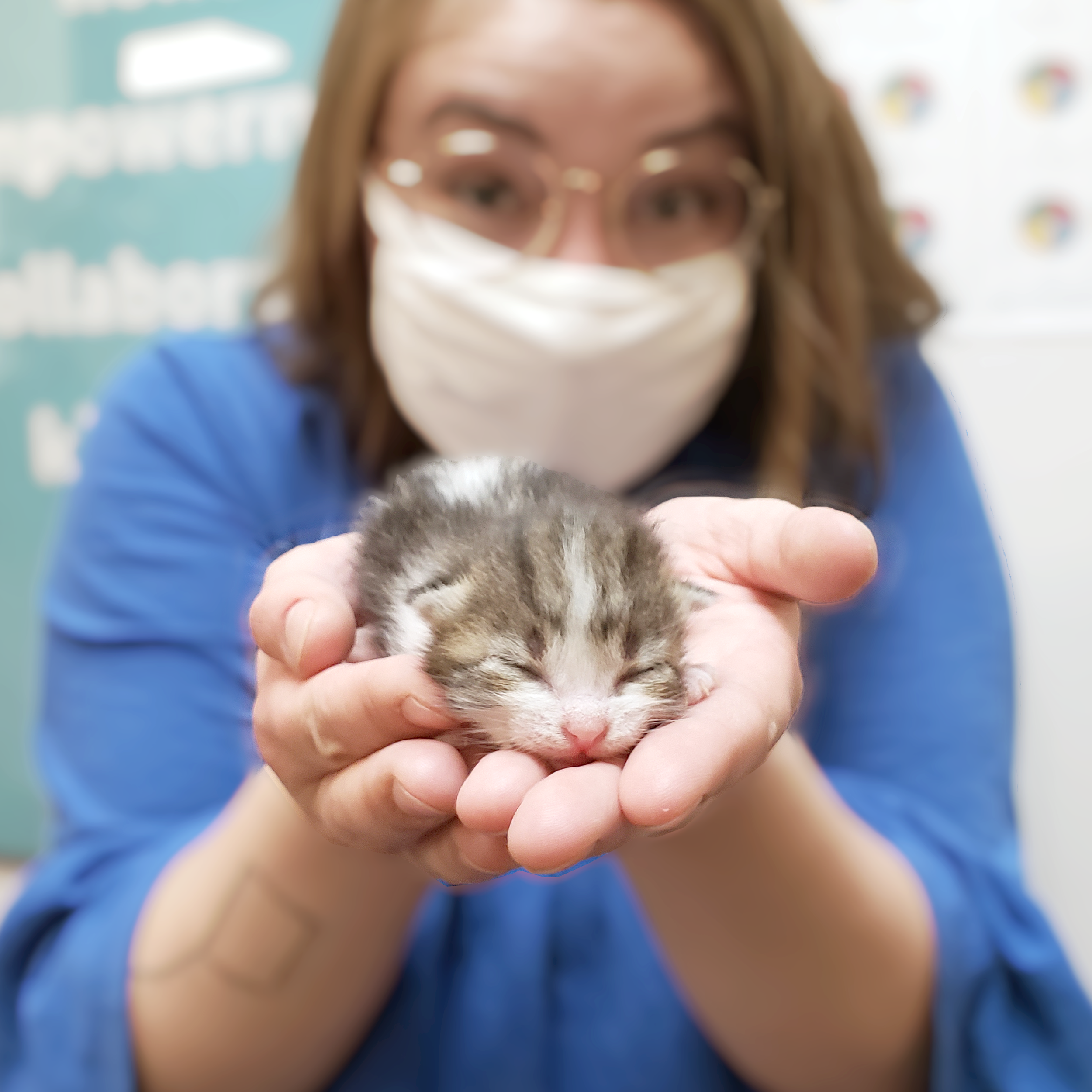
Tiny Paws, Big Hearts: Fostering Bottle-fed Kittens
Fostering Bottle-fed Kittens
Fostering at Blue Mountain Humane Society is a fulfilling and rewarding experience that allows you to make a difference in the lives of animals in need. If you're looking for a unique and heartwarming opportunity, consider fostering bottle-fed kittens who require special care and attention. As a foster parent, you'll have the chance to nurture these vulnerable little ones and provide them with a safe and loving environment while they grow and develop. Read on to learn more about how you can get involved in fostering at Blue Mountain Humane Society.
Becoming a BMHS foster:
Fill out an application: Start by filling out a foster application on our website.
Wait to hear back from our foster coordinator: Once we receive your application, our foster coordinator will review it and reach out to you to discuss potential foster animals. Our fosters are not able to choose who they want to foster. The foster coordinator will work with you to find an animal that fits your lifestyle and home environment.
Meet and discuss the care needed for the potential foster animal: After the coordinator identifies a potential foster animal, she will coordinate a time for you to come down to meet the animal and discuss the care needed for that animal. You will have an opportunity to ask any questions you may have about fostering and caring for the animal.
Take your foster animal home: If it's a good fit for you, you can leave that day with the foster animal. We will provide you with all the necessary supplies, including food, litter, and medication, as well as information on how to contact us if you have any questions or concerns while fostering.
Provide a safe and comfortable environment: Set up a safe and comfortable space for your foster animal. This may include providing a playpen or crate, bedding, and toys.
Meeting basic needs: BMHS will provide food, litter, bedding, bowls, any necessary medication, and all other supplies needed to care for the animal. Additionally, we will provide all necessary medical care.
Socialize and train: Spend time socializing and training your foster animal. This will help them become more adoptable and increase their chances of finding a forever home.
Attend adoption events: Attend adoption events with your foster animal to help them find a permanent home.
Return your foster animal: When your foster animal is ready for adoption or the foster period is over, return them to the Blue Mountain Humane Society.
Remember that fostering an animal requires time, patience, and love. By providing a safe and comfortable environment and helping socialize and train your foster animal, you can make a big difference in their life and increase their chances of finding a loving forever home.
Caring for and nurturing tiny felines
Welcoming newborn kittens into your home is a rewarding and challenging experience, especially if they need bottle-feeding. These tiny, vulnerable creatures require a great deal of care and attention, but with the right information and preparation, you can provide them with the love and care they need to thrive.
Preparing for Your New Feline Family Members
Before bringing home your bottle-fed kittens, it's important to prepare your home for their arrival. This includes creating a safe and secure environment, gathering the necessary supplies and equipment, and developing a plan for their care.
Creating a safe and secure environment:
Choose a warm, draft-free room or area to house the kittens.
Remove any potential hazards from the area, such as electrical cords, toxic plants, or other items that may be harmful to the kittens.
Set up a secure playpen or crate to keep the kittens contained when they're not being fed.
Gathering the necessary supplies and equipment:
Kitten formula or milk replacer
Bottles and nipples designed specifically for kittens
Heating pad or hot water bottle to keep the kittens warm
Soft, washable bedding for the kittens
Food and water dishes
Kitten-specific toys and scratching posts
Developing a plan for their care:
If any issues arise, call the foster coordinator who will provide access to a vet. Fosters are encouraged not to take the animals to an outside vet as they will be responsible for any medical bills.
The foster coordinator will discuss a feeding schedule and provide instructions on how, when, and how much to feed the kittens.
Feeding and Hydration for Bottle-fed Kittens
When it comes to feeding your bottle-fed kittens, it's essential to use the right formula designed specifically for kittens, as cow's milk or other types of milk can be harmful to their digestive system.
We will provide food for the bottle kittens.
The water requirements for the kittens may vary based on their size, age, and health condition. The foster coordinator will provide instructions on how to water the kittens.
Stimulating Elimination and Proper Waste Management
Proper waste management is essential for bottle-fed kittens to stay healthy and comfortable. Without their mother, they require assistance to urinate and defecate.
Use a warm, damp cloth or cotton ball to gently stimulate the kitten's genital area after feeding to encourage urination and defecation. This should be done several times a day, especially during the first few weeks of life.
Make sure to use a shallow, easily accessible litter box filled with a non-clumping litter that is safe for kittens. Kittens may need assistance getting in and out of the litter box at first.
If your kitten is struggling to eliminate, try adjusting their position by gently holding them in a sitting position over the litter box.
Make sure to clean the litter box regularly to prevent the buildup of waste and bacteria. Disinfect the box once a week with a mild soap and water solution.
Watch for any signs of constipation or diarrhea, which can be common in bottle-fed kittens. Contact your foster coordinator if you notice any changes in your kitten's elimination habits or if they seem uncomfortable.
Health and Wellness Concerns for Bottle-fed Kittens
As with any young animal, bottle-fed kittens can be vulnerable to a range of health issues. It's important to keep a close eye on your kitten's behavior and health to catch any problems early. Here are some common health concerns to watch for and how to address them:
Dehydration: Bottle-fed kittens are at risk of dehydration, which can be dangerous. Signs of dehydration include dry gums, sunken eyes, and lethargy. To prevent dehydration, make sure your kittens have access to plenty of fresh water and monitor their hydration levels closely.
Diarrhea: Diarrhea can be caused by a variety of factors, including a change in diet or an underlying health issue. Keep an eye on your kitten's stool and contact your foster coordinator if you notice any changes in consistency or frequency.
Upper respiratory infections: Kittens are especially prone to respiratory infections, which can cause symptoms like coughing, sneezing, and difficulty breathing. If you notice these symptoms in your kitten, contact your foster coordinator right away.
Parasites: Fleas, ticks, and other parasites can cause health problems in kittens. Check your kitten regularly for signs of infestation and talk to your veterinarian about the best ways to prevent and treat parasites.
Other health issues: There are many other health issues that can affect bottle-fed kittens, including infections, injuries, and genetic conditions. If you notice any signs of illness or discomfort in your kitten, don't hesitate to contact your foster coordinator.
Bonding, Socialization, and Enrichment
Creating a loving and stimulating environment is key to fostering healthy and well-adjusted bottle-fed kittens.
Encouraging play and exercise to build strong muscles and coordination.
Providing a variety of toys and activities to stimulate their senses and mental development.
Socializing your kittens with humans to promote healthy bonding and reduce anxiety.
Creating a comfortable and safe sleeping area for your kittens to rest and recharge.
Establishing a routine to promote a sense of security and stability for your kittens.
Transitioning from Bottle-fed to Solid Food
Transitioning from bottle-fed to solid food can be a challenging time for both you and your kittens. However, with the right guidance and preparation, it can also be an exciting milestone in their development. Here are some tips to help you through the process:
The best time to introduce solid food: Kittens should begin to transition to solid food between 3 and 4 weeks of age. This is when they start to develop their teeth and can begin to lap up food on their own.
Choosing the right food for your kittens: BMHS will provide a high-quality, nutrient-rich kitten food that meets their specific nutritional needs.
Tips for introducing solid food gradually: Start by mixing a small amount of wet food with formula or water to create a thin gruel. Gradually increase the amount of food and decrease the amount of liquid until your kittens are eating only solid food.
Monitoring your kittens' progress as they adjust to solid food: Keep a close eye on your kittens' eating habits, body weight, and overall health during the transition period. If you notice any issues, contact your foster coordinator.
Adjusting their diet as they grow and develop: As your kittens continue to grow, their nutritional needs will change. Make sure to adjust their diet accordingly by increasing the amount of food they eat.
Congratulations! You are now equipped with the knowledge and tools to provide the best possible care for your bottle-fed kittens. Remember to always prioritize their health, safety, and comfort. By following the guidelines and advice provided in this kitten fostering guide, you will be able to create a loving and nurturing environment for your new feline family members. Best of luck on your journey as a kitten foster parent!
Local resources:
Online resources:
ASPCA - Find resources on kitten care, including bottle feeding and fostering, on the ASPCA website.
Alley Cat Allies - Learn about caring for bottle-fed kittens and other aspects of kitten care on the Alley Cat Allies website.
Maddie's Fund - Find resources and guides for caring for bottle-fed kittens on Maddie's Fund website.
Best Friends Animal Society - Get tips and advice for fostering kittens, including those that require bottle feeding, on the Best Friends Animal Society website.
Kitten Lady - Watch instructional videos and read articles on kitten care, including bottle feeding, on the Kitten Lady website.
